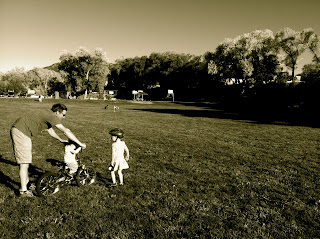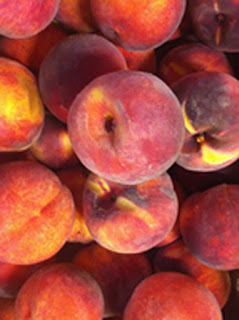For the past few days, I’ve been spending what feels like every waking minute hunched over my computer, editing a video of three-year-old Pippa learning to ride her bike. This is my first time, and though it is time consuming and frustrating, like learning another language, it's also weirdly satisfying. I say weirdly because I'm not the most patient or present person when it comes to DIY, especially high-tech DIY (and anything involving speaker wires, hammers, or yardsticks).
But as of this morning, after a 3.8 magnitude earthquake rumbled my writing loft, doing its best imitation of a furnace about to explode, and after I spent the next hour combing the web for reports of a quake, checking and double checking our boiler room for gas leaks, installing the carbon monoxide alarm that’s been languishing, forgotten, in our closet, I have a quasi-presentable little clip—set to music and not horrendously jittery—to show for my efforts. I taught myself how to do something. How novel.
And how frivolous.
That’s because, somewhere across town, right here in Santa Fe, a mother’s baby is dying of Tay-Sachs disease. If the story sounds familiar that’s because the mother, Emily Rapp, wrote an eloquent, devastating essay in Sunday’s New York Times. I began following Emily’s story last winter, after our mutual writer friend, Rob, introduced us on Facebook. She taught creative writing and had new baby and loved to hike, he told me. We should get together with our babies. We should be friends.
But my father was dying, and I was preoccupied with grieving and traveling—specifically, grieving and traveling with a five-month old in tow. By the time I got around to following up on Rob’s introduction, it was January, and Emily’s Facebook page had a worrisome tone. I scanned back a few days, weeks and then forward, trying to make sense of what I was reading. There were mentions of doctor appointments and missed milestones, encouraging comments from concerned friends. Then, in plain black type, came the diagnosis: Tay-Sachs disease. A rare, fatal, genetic disorder without treatment or cure. Shocking that something so shattering could be laid bare on the screen, seemingly innocuous and unadorned.
I sat at my computer on that Saturday morning, as the world outside frosted over, feeling stunned. I didn’t know Emily. I didn’t know her son, Ronan, but I knew this terrible, final, irrevocable thing about her. I felt as though I ought to know her better, now that I held this terrible news, even while I knew with unequivocal certainty that we would not go hiking or go out for tea afterwards and talk about our favorite writers or new books we loved. Our friendship was over before it began. But what I didn’t know is that I would think of Emily nearly every single day since then, and marvel at her strength and bravery as a mother and weep for her dark-haired one-year-old son who might not live to be three.
But many days when I thought of her, it was with despair and fear for my own children, for their fragility and mine. How is it possible to keep them safe, to keep us all safe? Last fall when my father was dying, I saw for first time how life hangs in a delicate balance, a spider web of hope, good health, and possibility strung from the ceiling, tenuous and easily swept away. Every irrational fear that could worm its way into my brain did, lodged there like an unwelcome, intractable houseguest. I spent many months in a deep state of anxiety. I had known, of course, that everyone eventually dies. But I hadn’t really known it. And now that I did, I couldn’t stop thinking about it, worrying about it, dreading it. Emily’s story haunted me, a devastating reminder that it happens to anyone, everyone, all the time: to fathers who are not so very old and children who are far too young and to mothers who love them madly.
All winter and spring, I read her essays and blog posts, and watched as she grappled with Ronan’s illness and her own unscripted role as a mother of, as The New York Times put it, “a child with no future.” Her writing was eloquent and unflinching—reading her stories, I could tell that the act of writing was essential to her, a way to save her own life even if she couldn’t save Ronan’s. There was nothing extraneous—every deliberate word seemed to propel her forward into a new uncertain world, her world, like hands fumbling for a light switch in a darkened room. One step, and then another—words on the page a lifeline from this moment to the next. I felt this, viscerally, absolutely, and was filled with admiration.
And guilt. How could I write about running or eating peaches or teaching my three-year-old to ride a bike or my one-year-old to sit still in a raft like a seasoned river baby, when another mother, whose baby will never grow to ride a bike, was wrestling with the biggest question of all: How do I help my child live and die with grace and dignity? If I really thought about it, it seemed possible, and perhaps preferable, to stop writing altogether.
But I didn’t. Emily inspired me. I kept muddling through, even when the hollowness of my own stories, the seeming inconsequential-ness of them, felt like a deliberate slap in the face to this Santa Fe mother whom I didn’t know but who had been generous and open enough to let me feel as though I did.
Like most writers, I write to make sense of the world, and my own life. Sometimes when I’m very lucky, the world and my little slice of it overlap in serendipitous ways, and I remember again how important it is to always keep my heart and eyes open, that inspiration comes from remarkable places, and that everything leads us to a new place. When this happens, it feels as though we are pieces in a larger puzzle that is slowly forming, fitting itself together, revealing itself gradually, in increments, until we can see a new picture in its entirety. This is how it has felt reading Emily: uncomfortable, terrifying, tragic, humbling, illuminating.
Now, after reading "Notes from a Dragon Mom," I see my fear and self-doubt in a new light, with more patience, acceptance, and compassion. “Parenting, I’ve come to understand, is about loving my child today,” she writes. “Now. In fact, for any parent, anywhere, that’s all there is.” These words are a gift, and consolation, to us all, but at such an unbearable cost.
So I will keep racing after Pippa as she wobbles around the basketball court on her pedal bike. I will hike on Tuesday mornings with Maisy on my back, up to the same ledgy overlook with all of Santa Fe sprawling out below me. I will spend ridiculous, untold hours editing scrappy little homemade movies, and I will keep writing, about raising my daughters to be fiercely alive, outdoors, in the wind and the sun, crashing their bikes and getting back on again. This is OK. This is more than OK. This is what I do today. This is how I live now. This is all there is.



















